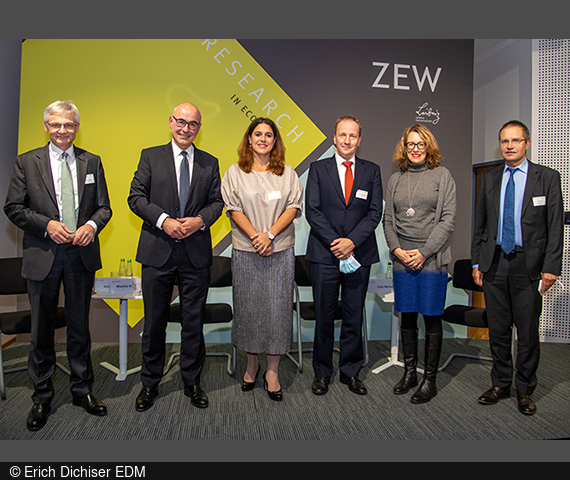Celebration of the 30th Anniversary of ZEW Mannheim
EventsPanel Discussion on the Role of Economic Research Institutes
What role do economic research institutes play in addressing economic policy challenges in Germany and Europe? This question was the topic of the panel discussion on 8 November 2021 on the occasion of the 30th anniversary of ZEW Mannheim. ZEW President Professor Achim Wambach was joined in the discussion by Dr. Guntram Wolff, director of Bruegel in Brussels, and PD Dr. Monika Köppl-Turyna, director of EcoAustria in Vienna. The panel was moderated by Silke Wettach from the news magazine “Wirtschaftswoche”.
The keynote speech at the event was held by Dr. Georg Müller, CEO of MVV, who, as chairman of the ZEW Sponsors’ Association, made clear the strong relevance of ZEW.
In his welcoming speech, ZEW President Professor Achim Wambach outlined the development of ZEW from an economic research institute that was ahead of its time with its empirical research work in the founding year 1991 to becoming one of the most important economic research institutes in Germany and Europe today. Not only will economic research institutes have to deal with the increasing relevance of data in the future, but also with the greater importance of teamwork as well as the transfer of research results, said Achim Wambach. The ZEW President also congratulated Professor Friedrich Heinemann, head of the ZEW Research Department “Corporate Taxation and Public Finance”, for 30 years of successful research and cooperation at ZEW. With his wide-ranging expertise, he has contributed significantly to ZEW’s high visibility since 1991.
In his keynote speech, Dr. Georg Müller, chairman of the ZEW Sponsors’ Association, emphasised the excellence of ZEW and its researchers. The findings published under the ZEW brand are considered to be highly relevant. Müller appealed to ZEW to keep up the good work and to continue to make its voice heard in public debates in the future.
Peter Altmaier (Federal Minister for Economic Affairs and Energy) and Winfried Kretschmann (Minister President of Baden-Württemberg) also congratulated ZEW on its anniversary via video. Kretschmann described ZEW as “powerful, dynamic and on the cutting edge” and Altmaier hopes that ZEW’s work will continue to find its way into political deliberations in the future.
Europe, Green Deal and the problem of greenwashing
One of the highlights of the programme was the panel discussion on the topic, “After the federal elections. Setting the economic policy course for Germany and Europe – What’s the contribution of economic research institutes?”.
According to ZEW President Professor Achim Wambach and Dr. Guntram Wolff, director of the Bruegel Institute in Brussels, a major challenge for economic research institutes is the transfer of research results from science to politics. There is often a conflict of goals between the demands of politics and science, and a balance is necessary in many cases, but often not easy to achieve. At the same time, cooperation between politics and science is more important than ever because of the enormous economic policy challenges for both Germany and Europe.
In the opinion of the panellists, the EU was given too little attention in the last federal election campaign. Despite its huge importance, Europe played only a minor role in the election. As an economic heavyweight, however, Germany’s positioning on various EU issues is decisive – especially against the backdrop of growing protectionism and nationalism in various Member States. “It is all the more important now to bring the benefits of the EU and free trade back into the spotlight,” explained PD Dr. Monika Köppl-Turyna, director of the EcoAustria research institute in Vienna.
On the issue of climate change, the EU has taken a decisive step with the Green Deal. Attempts are already being made to circumvent regulations, for example through so-called greenwashing. Wolff spoke out in favour of establishing clear standards and uniform certificates to prevent greenwashing. Referring to the EU’s “Fit for 55” package, Wambach said: “Germany must take a clear stance. If the government doesn’t have a uniform position on this because the coalition partners can’t agree, then Germany is slowing down the European decision-making process.”
The panel also discussed what could have been done better during the COVID-19 crisis. According to Achim Wambach, the coronavirus crisis, like the financial crisis, has ruthlessly exposed existing shortcomings from which we should draw lessons for the future. In any case, health policy should be better coordinated in Europe, said Wambach. The recovery fund was necessary, but opportunities were missed in its design. Europe needs a fiscal instrument to mutually hedge risks. However, the recovery fund only partially fulfils this purpose.
Asked how research institutes should deal with the fact that science is often very fragmented, while policymakers mainly expect answers to “big” questions, Wambach replied that institutes provide insights into smaller questions that are part of a larger puzzle. Science cannot be transferred one-to-one to politics, as there are multiple factors in politics that would have to be taken into account. For this reason, political decisions cannot be purely scientific.
The evening ended with a reception where the participants could further discuss their ideas.
